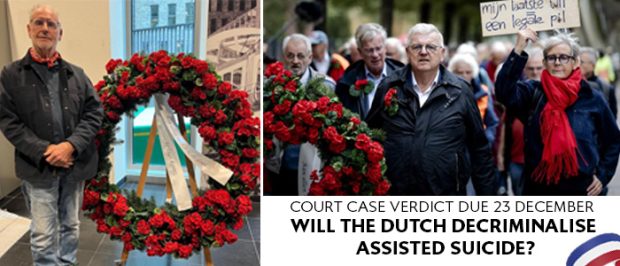October 6, 2025
Court considers the question: should assisted suicide remain a criminal offence?
Coöperatie Laatste Wil (CLW) is facing the state in an appeal this Monday concerning assisted suicide. It is a criminal offence, but they believe it should not be reports Susan Wichgers.
Demonstrators from the Steungroep Dappere Burgers (SDB) at the Palace of Justice in The Hague. The demonstrators were supporting a man who was on trial for inciting and assisting suicide with Middel X.
This Is it right that people can be prosecuted for assisting suicide?
The judges of the Court of Appeal in The Hague will have to consider this question during an appeal by the Last Will Cooperative (CLW) against the state.
The CLW and its 29 co-plaintiffs are seeking a breakthrough in the legislation surrounding assisted suicide this Monday.
They know they have the “moral and financial” support of the Dutch Association for Voluntary Euthanasia, from which the more activist CLW once emerged.
“State restricts the right to self-determination”
Under current law, assisted suicide is a criminal offence. And that, according to end-of-life activists, is contrary to “fundamental human rights”.
They argue that everyone has the right to decide when to end their life and how they die. In their view, the state restricts that right by criminalising assisted suicide and limiting access to a good “means of ending life”.
Not only is the law itself a thorn in the side of the plaintiffs, they also criticise the active prosecution of people who offer assisted suicide.
Members of the CLW often find themselves in the dock in court: several members have been prosecuted in the past for violating the law that the club is challenging this Monday.
This happened, among other things, during the cooperative’s living room discussions, intended to talk about the end of life, where a number of members allegedly distributed suicide powder substance X.
The judge generally rules leniently in such cases – it usually does not go beyond a slap on the wrist in the form of a suspended prison sentence or community service.
But it is not the case that the judiciary is on the side of the CLW: previously, the court did not agree with its claim against the state.
Protection of human life
In 2022, the judge acknowledged that every human being has the right “to decide how and when their life is ended”, but emphasised that the state has an obligation to protect human life.
The judge also referred to the Euthanasia Act, which allows doctors to assist in dying under certain conditions. In doing so, the judge ruled, the state has already found “a careful balance”.
That is precisely where the CLW sees the problem. Euthanasia requires a medical basis and the involvement of a doctor.
This is not true self-determination, according to the activists, because not all people who wish to die have a medical condition from which they are suffering.
They are advocates of the so-called “autonomous route”: they believe that a person should be able to die in a humane manner without the intervention of a doctor.
For example, the cooperative publicised suicide powder X and is now investigating the use of the Sarco, a suicide capsule that fills with nitrogen at the touch of a button.
Little chance of success
Will the court of appeal, unlike the district court, side with the CLW? That chance is small, says emeritus professor of health law Johan Legemaate. ‘Some human rights can be enforced, but that does not apply to the right to self-determination at the end of life.
The European Court of Human Rights has ruled on this: as a government, you are allowed to make broader rules about the end of life, but that choice is up to the legislator.’
However, Legemaate adds that even if the judges do not rule in favour of the CLW, that does not mean that the process is useless for the cooperative.
‘Another goal is to highlight a social development and stimulate debate. In that sense, it is useful in any case.’
